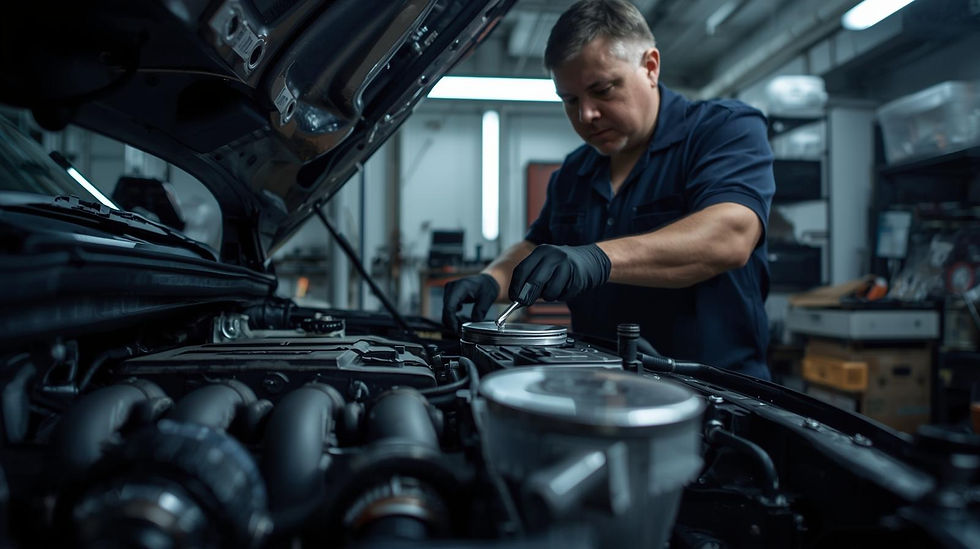Optimizing Diesel Engine Performance and Efficiency by Minimizing Friction with AW10
- Cost Effective NZ Team

- Jul 1
- 3 min read
Updated: Oct 19
For mechanics, car enthusiasts, and drivers, understanding how to reduce friction can lead to remarkable improvements in both power output and fuel economy. This post explores how friction impacts diesel engines and how AW10 can provide effective solutions.
Understanding Friction in Diesel Engines
Friction is a natural force present in all machinery, including diesel engines. In a diesel engine, various components, such as pistons, crankshafts, camshafts and bearings come into contact and generate friction, which causes energy loss in the form of heat. Increased friction requires more power, leading to decreased efficiency and higher fuel consumption.
To visualise this, think of friction as a thief that steals energy from your engine. When engine parts rub against each other, resistance builds up, which means you need to burn more fuel for the same level of power. For instance, reducing friction by just 10% can often result in a 5% to 10% improvement in fuel efficiency, translating into significant savings over time.
How Friction Affects Power and Economy
Friction in diesel engines can stem from several sources, including:
Engine Components: As mentioned, moving parts like pistons and crankshafts create friction, which can hinder performance.
Lubrication: The type of oil used plays a pivotal role. Poor lubrication increases friction, causing faster wear and reduced efficiency. For example, switching from conventional oil to synthetic oil can lead to a 20% reduction in friction.
Heat Generation: High friction results in excessive heat buildup, which can lead to overheating and efficiency losses, further compromising engine performance.
These friction sources can cause a decline in performance and economy. For diesel-powered vehicles working under heavy loads, this sometimes means an increase in fuel stops and extensive repair costs due to accelerated wear on engine components.
Solutions for Reducing Friction
To reduce the friction that drains power from diesel engines, several practical solutions are available. One of the most effective is using high-quality lubricants specifically formulated for diesel engines.
High-Quality Lubricants
Using advanced lubricants can drastically lower friction levels. High-quality oils create a more effective film between moving parts, minimizing wear. For example, synthetic oils are engineered to withstand higher temperatures and provide better lubrication than conventional oils.
Engine Design Improvements
Engine manufacturers are increasingly focusing on reducing friction in their designs. Techniques such as surface hardening and using specialized materials can minimize the contact surface between moving parts.
AW10: A Game Changer
AW10 stands out as a revolutionary product in the market aimed at reducing friction in diesel engines.
AW10 is and advanced additives that tackles the wearing of engine components significantly reducing friction. Here are some essential benefits of using AW10:
Enhanced Lubrication: AW10 improves lubrication in diesel engines, allowing them to operate smoothly and effectively.
Increased Power Output: With reduced energy lost to friction, AW10 enables the engine to transfer more power to the wheels effectively.
Improved Fuel Economy: The advanced formula not only enhances performance but also increases fuel efficiency, as an outcome of reducing friction.
Reduced Heat, Wear and Tear: Less friction means less heat and wear, extending the lifespan of engine components and lowering overall maintenance costs.
Final Thoughts

Minimizing friction in diesel engines is critical for maximizing power output, extending engine and improving fuel economy. By understanding how friction impacts engine performance, mechanics, car enthusiasts, and drivers can make informed choices about their lubricant selections, especially with products like AW10 that significantly enhance engine efficiency.
Embracing high-quality lubricants and innovative technologies can help make achieving optimal diesel engine performance a reality. As the push for better efficiency continues, products like AW10 will be crucial in transforming how we think about diesel engines, power, and economy. By tackling friction, we are not just boosting performance; we are also moving towards a more efficient and sustainable future in diesel technology.




Comments